- Home
- S. Hussain Zaidi
Mafia Queens of Mumbai Page 4
Mafia Queens of Mumbai Read online
Page 4
She decided to make herself some tea. She took a small vessel, filled it with water and placed it on the stove to boil.
Jenabai looked at the framed inscription of a saying from the Koran that hung on the wall opposite her kitchen and closed her eyes for a fraction of a second. She had already decided to try her best, but left it to God to show her a way out.
When the water was boiling, Jenabai spooned tea and sugar into the vessel. She turned the gas stove off and was about to pour out the tea when she heard a loud knock on the door of her room.
‘Maasi, open the door,’ a young voice said.
Recognising the voice, she placed the vessel back on the stove, got hold of her dupatta and moved towards the door, opening it slowly. Dawood stood there; he was sweating profusely.
Without saying a word, he entered the room with a familiarity that revealed how often he visited her home. He went towards the sink and rinsed his face. Jenabai, meanwhile, made a conscious attempt to compose herself.
‘Oy, chhokra, what’s happened now?’ she asked, referring to the sullen look on Dawood’s face.
‘Don’t ask. Just one of those usual fights but the man is badly hurt,’ he said.
‘Whom did you beat up? she asked.
‘Maasi, it was that notorious Hamid Chuha from Manish Market. The man had become a big menace. You know we’ve been fighting for control over some of those shops. I went to sort things out with him today, but this time he really got out of hand and I beat him up.’
‘Hmm ... good. So you evened things out finally.’
‘But now I am in trouble, Maasi... Chuha is in the ICU and the dress-wallahs (the police) are after me ... my father also knows about it and he won’t spare me either. I don’t want to be beaten up by him. Please help me Maasi, get me out of this situation.’
Jenabai sat silently for some time, trying to sort out the whole issue in her head. Suddenly, the wheels in her mind started turning and she said, ‘No one will dare to harm you in my presence. But I hope you realise that it won’t be easy for me to convince both the police and your father at the same time.’
‘I know only one thing—however difficult things are, nothing is impossible for you.’
Jenabai gave him a small smile. ‘I may need a favour from you sometime soon. Will you agree to do it for me?’
Without the slightest hesitation Dawood agreed. ‘Maasi, I am ready to lay down my life for you. You are like my mother.’
‘So leave it on me then. But for now, just stay put at my place,’ she said.
‘No, Maasi, it is not safe. I will come and meet you tomorrow. Would you be able to sort things out for me by then?’
‘Come tomorrow, we will see .,.’ she replied, handing him a towel to wipe his face.
Later in the evening, Jenabai made an unexpected visit to Mussafir Khana. Dawood’s father, Ibrahim Kaskar, was sitting on the single bed at the end of the room with his hand on his head; tense, angry—and yet an air of fragility hung about him because of his age. The atmosphere in the room was solemn when Jenabai entered the room.
‘Salaam Jenabai, come in. How come you are here?’ he asked. She entered and sat on the small stool in the room.
‘Salaam. Ibrahim bhai, I heard about Dawood, so I thought I’d come and meet you. Has he come home?’
Ibrahim turned red. ‘He won’t dare to come home. Dawood has left me ashamed. I had so much respect among the police fraternity and he has stripped me of it.’
She heard him out patiently, allowing him to vent his frustration. Aamina came in with some tea for Jenabai. Both the women hugged. ‘Our bad days are here, Aapa. Dawood has done it again,’ Aamina said, crying as she released herself from Jenabai’s embrace.
‘Don’t cry, your son is not at fault, he is a nice boy,’ Jenabai said.
‘What are you saying? At least don’t support him. That Hamid Chuha is suffering in the ICU; he is caught between life and death. The police has already come here twice. It is such shame, everyone is talking about it,’ Ibrahim said angrily.
‘Arrey Ibrahim bhai, don’t talk about that Hamid Chuha—he is a very bad man. It is actually good if he dies. He has troubled so many people. Our Dawood had just gone to sort out matters with him. But it was he who started beating him up. Whatever Dawood did was in self-defence.’
‘How do you know so much, Jenabai?’ Ibrahim asked suspiciously.
‘Dawood is like my son. The moment I heard about the incident, I first thought about you and Aamina bi. I enquired with some boys who were present at the shop when the fight took place between them. They told me that it was not Dawood’s fault.’
‘By the grace of God, my son is innocent,’ Aamina said when she heard this.
Ibrahim was not as easily convinced. ‘Jenabai, we need two hands to clap. I have seen so many such fights during my service and I know that my son is not innocent.’
‘Bhai, Dawood was beaten really badly. If he did not defend himself, we would have been attending his funeral today. Would you choose Hamid Chuha over Dawood?’
Ibrahim did not say anything for a long time. Then: ‘If this is the case, I would like to speak with Dawood. He can’t afford to repeat such a thing again.’
‘I will try and track him down and tell him to meet you. Just don’t be harsh with him. He is a nice boy and you can trust me. I would have killed to have such a son.’ Saying this, Jenabai walked out of the room.
Feeling confident that she had sorted out half of Dawood’s problem—his fear of what his father would do to him—Jenabai turned her mind to the other half. The men who could put Dawood behind bars. His track record and unpopularity with the police department was a known fact and Jenabai knew that if she had to turn things in her favour, she would have to go directly to someone with power.
The next day Jenabai made a trip to the Crime Branch office at the Mumbai Police Headquarters in Crawford Market. She had decided to meet one of the most reputed and distinguished senior Crime Branch officers.
Tall, burly and well-built, the officer was considered a taskmaster in his time. Having served in the Crime Branch for years, he knew its ways well. As an informant, Jenabai had always maintained cordial relations with the officer.
The officer was at his desk when one of his constables rang him about Jenabai. Surprised, he asked the constable to call her in.
‘Come in Jenabai. Salaam. What brings you here today?’ the officer asked.
‘I was going to buy some vegetables from the market so I thought I’d just drop by to meet you.’
‘Well, that’s good. It means I get to finally meet you after months because of your vegetables,’ he joked.
‘Sahib, I sing your praises to people almost everyday. I even tell my people that the police force hasn’t seen a better officer,’ she said.
After a few more minutes of small talk, Jenabai decided to get to the point. ‘Sahib, I feel bad for you. These gang wars in the city are keeping all you dress-wallahs busy.’
‘Yes, we have a big task at hand. In fact, it was only yesterday that Dawood and his goons beat up a shop owner from Manish Market. That man’s condition is very serious and that haraami Dawood is absconding.’
‘Did you go to his home? He must be hiding there.’ she said.
‘Usko paagal kutte ne kaata hai kya? (Has he gone mad?) He won’t dare to sit at home. Our officers are watching his house anyway, but that boy is too clever, he won’t go there. I feel bad for his father sometimes. Look at him and look at his son.’
Jenabai did not say anything. She knew what was coming.
‘By the way, if I am not mistaken, you know their family well, right?’ the officer enquired.
Jenabai suppressed a smile. This was going to be much simpler than she had thought it would be.
‘Well... our families are very close... all of us, including Dawood.’
‘Hmm ... yes, I was wondering if you could help us out.’
Jenabai stiffened and said, ‘Sahib, what are you s
aying! This will be next to impossible for me. I can part with any amount of information, but how can I tell you the whereabouts of someone whose family is close to me.’
The officer was all attention immediately. ‘Does that mean you know where Dawood is?
"No ... I don’t.’
‘But you just said—’
‘I don’t know where he is at the moment but Dawood does listen to me. He treats me like his mother. I may also be able track him down ... but ... but, this will come at a price.’
The officer was taken aback. This woman had the nerve to lay down conditions in front of a senior Crime Branch officer! Calming down, he asked, ‘And what will you do for me?’
‘What if I make Dawood your informant?’
‘Informant?’ the officer asked, shocked.
‘Well, I am sure you know what it would be, to make Dawood an informant. He is an upcoming gangster, and his knowledge of the underworld is indisputable. Also, he has the reputation of being sincere to the cause of the underworld. No one will doubt him,’ She paused to let that sink in, and then continued, ‘If you make him an informant, you can also keep a check on his own activities and in the process clip his wings before he learns to fly.’
The officer didn’t say anything for a few minutes. Then he asked, ‘And what would the price be for this?’
"Nothing ... Just drop all charges against him,’ she said.
‘Are you out of your mind, Jenabai?’ he shouted, adding ‘I respect you but that does not mean you can take advantage of my goodness. I won’t drop any charges against him ... never.’
‘Is that your final word, Sahib?’
The officer did not reply. Picking up a file, he pretended to be engrossed in what he was reading. Watching him behave this way, Jenabai decided to walk out, half-dejected and hopeful at the same time. When she opened the door to leave his room, the officer, without looking up from his file, said softly, ‘I will need time.’
‘How much time?’ she asked.
‘This is no joke ... I will take my time.’
‘So should I presume you won’t harm him till then?’ she asked.
The officer did not speak.
‘I will fulfil my promise, I hope you will too,’ she said and walked out, pleased with herself.
Unexpectedly, Dawood did not turn up at her place that day. Jenabai was eager to break the news about his father and the police to him. She also felt it was a good time to talk to him about the meeting she and Mastan had planned. When there was no sign of Dawood, she decided to have dinner and go to sleep.
At around 3.40 a.m., she heard a faint knock on her door. Assuming she was imagining things, she ignored it. Half-a-minute later, she heard another knock on the door. A soft voice said, ‘Jenamaasi, Dawood here.’
Jenabai moved to the door, opening it quietly, careful not to wake her son who was also sleeping in the room.
‘Maasi, any luck?’ Dawood asked.
‘What do you think?” Jenabai smiled. ‘Your maasi has managed everything, now you are a free bird and I’ve spoken with your father as well. Just be careful for some time though, the dress-wallahs as usual have not given me a full assurance,’ she said.
‘I will handle that,’ he said.
A very relieved Dawood drank the glass of water offered and was ready to leave when Jenabai stopped him.
‘Now it is your turn,’ she said.
‘Oh! Yes, of course. What do you want me to do, Maasi?’
‘Mastan bhai is tired of your gang war. You boys have caused a lot of commotion in Dongri. Do you realise that you all are fighting against your own brothers?’
Dawood remained silent, so Jenabai continued, ‘Mastan wants the Pathans and you all to unite and become one strong force, so that nobody takes us lightly. For this, he wants to have a joint meeting with you all.’
‘Maasi, I won’t come. I do not want bloodshed in Mastan bhai’s house.’
"Nothing of that sort will ever happen in my presence. You promised me, now you can’t back out. Just get Sabir and come. I will let you know when ...’
Dawood was in a tight spot. He did not want to be part of the meeting—but he had given her his word.
And so Jenabai had her way.
Chapter 10
MASTAN S MASTERSTROKE
M
umbai’s warring gangsters finally met at Mastan’s bungalow in the wet month of July.
On that particular day, Jenabai had been at Mastan’s home since dawn. Apart from Mastan, the domestic help and her, no one else was present in the house.
After a series of intense discussions with Karim Lala, the three had drawn the final list of invitees for the meeting that was going to be held that night.
As part of a mutual understanding, everyone was requested not to carry any sort of weapon to prevent the chance bloodshed.
The worry on Mastan’s face was apparent as the time for the guests’ arrival approached. Though Jenabai tried to assure him of a good outcome, he was unsure about what would actually ensue from the meeting.
The visitors started pouring in by late evening. Jenabai was not as concerned about the others as she was about Dawood and Sabir. To suppress the duo’s volatility, Jenabai had specifically asked Mastan to call her close friend and their father Ibrahim Kaskar, for the meeting. Finally, they were all there: the Pathan chief Karim Lala and his gang Dawood, Sabir and their father, Majid Kalia, Hussain Somji, Dilip Aziz, Hanif—all sitting in cold silence.
The fact that Jenabai was the only woman there, sitting amongst them and chatting comfortably with the men, said much about her influence and the respect that she was accorded in the underworld at the time.
When the meeting was set to begin, Jenabai went and sat beside Dawood, holding his clenched fist—in some way trying to convey to him the importance of maintaining his cool throughout.
Mastan finally stubbed his cigarette out in the glass ashtray on the dining table and approached his visitors.
‘It gives me great pride to see my brothers sit together under one roof today. There has been a lot of bad blood and misunderstanding between us. But I want all of us to be one again and I have chosen my home to be the humble ground for this reunion,’ Mastan said. No one in the room spoke. Jenabai, however, threw smiling glances at each and every person in the room.
Mastan looked at the faces of each of his visitors and said, ‘We are all Muslims, and though we believe in the same religion, we have failed to identify our common enemy. Instead, we indulge in in-fighting and bloodshed, killing our own brothers. We have made a mockery of our faith and have made fools of ourselves. Everyone is laughing, including the government and the police.’
‘Very well said, Mastan bhai. We have become jokers. The government thinks we can harm no one except our own brothers. Yah Allah ... what have we made of ourselves?’ Jenabai contributed her bit.
‘This is nonsense. We have always cared for other Muslims. In fact, we never initiate attacks. We cannot help it if others consider themselves superior and try to crush every step we take,’ Dawood said.
The Pathans immediately stood up. ‘You think we consider ourselves superior? Now, you kids will teach us how to do our work? Let’s settle this now, once and for all, and you will soon know who is superior,’ one of the Pathan’s men said, drawing his pistol.
Dawood’s brother Sabir rose in a fit of rage and was preparing to attack when Jenabai got up in anger. ‘We strictly instructed you not to carry that gun. This is Mastan bhai’s home, not a batdefield. You men can do what you want outside his house, not here.’ She turned to Dawood and stared expressionlessly at him.
Realising the consequences Sabir’s behaviour could have, Dawood caught hold of him and asked him to sit.
Mastan, relieved that Jenabai had managed to control the situation, said, ‘For the sake of Allah and Islam, let us resolve our differences. Let us take an oath that we shall refrain from targeting each other in future.’
Jenabai got up almos
t immediately and covered her head with her white dupatta as if in prayer and went into the next room. The visitors sat tensely, wondering where she had gone. Moments later, she came out with a Koran which was covered in a dark green cloth. She placed it carefully on the side table and came and sat with the guests. One of the visitors asked his boys to place the Koran on the centre table.
‘Let us take an oath on the Koran,’ Mastan said.
Jenabai encouraged Dawood and Sabir to place their hands on the holy book; once they did, others slowly followed. Putting their hands out, the men softly muttered that they would abstain from killing their brothers and live peacefully and in total harmony.
Soon after this meeting, Mastan let them in on the problem he was facing on Belassis Road. The Pathans and Dawood’s gang met the tenants and ordered them to vacate the land. The Chiliyas fought fearlessly; however, they couldn’t stand up to the joint might of the two gangs and they finally lost their land. Mastan then went on to build a tall, multi-storied building on the same plot.
It was a historic peace pact in the history of the Mumbai underworld, engineered by Mastan at his house and whose chief architect, undisputably, was Jenabai.
Chapter 11
TWELVE YEARS LATER—
THE GANDHIAN’S MARCH
I
t was January 1993, just a few years before the island city of Bombay became Mumbai.
Mumbai, the city of dreams, which had always been seen as a smorgasbord of diverse religions, was suddenly shrouded by the communal shadows of the past. Tremors of the demolition of the Babri Masjid in Ayodhya on 6 December 1992 had caused violent aftershocks in the city, leading to politically-motivated and planned rioting between Hindus and Muslims.
The riots had led to the systematic slaughtering of people from both communities. Several hundreds were killed and thousands rendered homeless by rampaging, angry mobs. Mumbai was literally burning in the fire of religious discord.

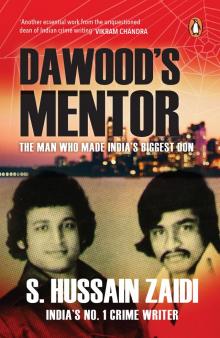 Dawood's Mentor
Dawood's Mentor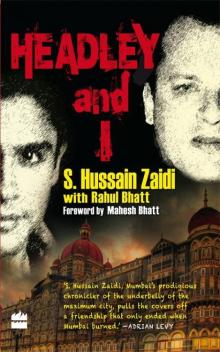 HEADLEY AND I
HEADLEY AND I Mafia Queens of Mumbai
Mafia Queens of Mumbai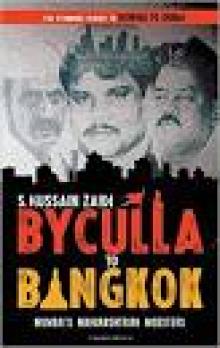 Byculla to Bangkok
Byculla to Bangkok Black Friday
Black Friday The Endgame
The Endgame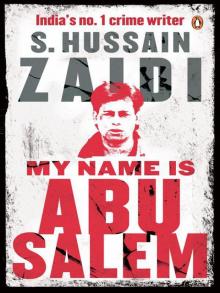 My Name is Abu Salem
My Name is Abu Salem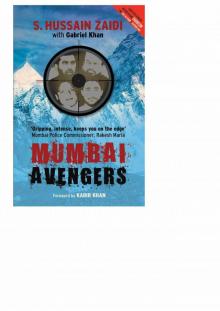 Mumbai Avengers
Mumbai Avengers Dongri to Dubai - Six Decades of the Mumbai Mafia
Dongri to Dubai - Six Decades of the Mumbai Mafia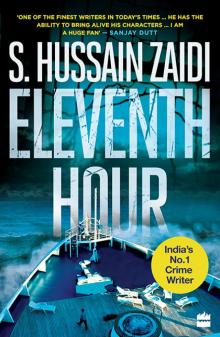 Eleventh Hour
Eleventh Hour